| » BROJ 79 |
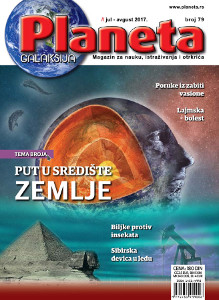 |
Godina XIV
Jul. 2017- Avgust. 2017.
|
|
| » Glavni naslovi |
SUMMARY
Summary
TOPIC OF THIS ISSUE
JOURNEY TO THE CENTER
OF EARTH
|
|
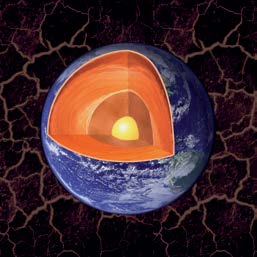 |
The central point of Earth is located more
than 6,000 km beneath the surface,
and the nearest layer of the core is approximately
3,000 km below us. The deepest hole
drilled by humans at the planet’s surface
is the Kola super hole at the Kola peninsula,
near Murmansk in Russia – it reaches the
depth of 12.3 km.
All events on Earth, known to men, take
place close to its surface. Lava that comes up
from the volcano melts at profundity of several
hundred kilometers beneath the surface.
Even diamonds, who require extremely
high temperatures and pressure, are formed
in rocks at the depth lesser than 500 km.
Everything beneath that is shrouded
in mystery and seems unfathomable. Still,
surprisingly much is known about the core.
There is a certain idea about the way it was
formed several billions of years ago, and all
with not a single physical sample. How does
the core reveal its secrets?
|
MATHEMATICS
Games with numbers |
|
 |
Already at the very first event “May, month
of mathematics” the organizers achieved
the basic objective: popularization of this science
– difficult and requiring for a majority of
people. This year’s, sixth traditional event, held
in Belgrade, they made a step further – by including
a Mathematical Show in the program. A
slogan „“Mathematics, my own chance” indicated
that the event would be dedicated to combinatorics,
probability, statistics – in a word those
mathematical areas which are evidently applied
in everyday life. The international mathematical
show, presented in the first week of the
event, brought together seven, primarily outstanding
populizers of mathematics.
The Irish mathematician, member of the
national Academy of Science, writer and amateur
magician, Colm Mulcahy, dedicated his
lecture to Martin Gardner, mathematician,
journalist advocating recreational mathematics,
and also author of hundreds of serious
mathematical studies. To a prevalently young
audience he presented implementation of Fibonacci
sequence (1,2,3,5,8,13… in which the
next number in the sequence results from
summing of the previous two) using a card
trick where, with a little bit of skillfulness,
based on the sum of the two dragged out cards,
one can easily conclude which are the cards in
question. From him it could be learned that
the number of possible arrays of the 52 cards in
a pack is 8x1067, which is more than the number
of particles in a galaxy.
|
ENERGY
Small hydro power plants |
|
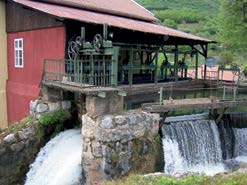 |
Contribution of each renewable source of
energy is significant even if it is measured
in percentages. Such is the case of small hydro
power plants; the portion of electricity they generate
is, in the overall production, measured
in percentages. By definition, this category concerns
power plants of installed power bellow 20
MW (the upper limit in the USA and Canada stands
at 50 MW, and in Serbia at 30 kW).
Advantage of small power plants is that
they do not require substantial civil works and
do not have significant water reservoirs before
the dams, therefore, their impact on the
environment and the eco- system is lesser by
far. They use the energy of water courses and
channels, irrigation networks, energy of ocean
waves, sometimes small streams where the fall
of water does not exceed 20 m. The advantage
of such a power plant is that it has minor environmental
impact and is, therefore, ecologically
acceptable. A special type of power plan is
being placed directly into the waterway, which
additionally simplifies the civil works, reduces
investments, does not disturb river traffic and
has no impact on biosphere, while it needs to
be mentioned that their power is also small,
25-50 kW.
|
EXPLORING THE UNIVERSE
Space probe missions |
|
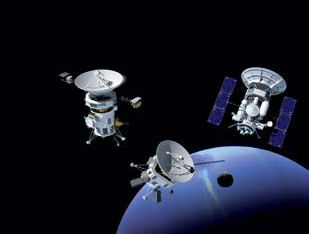 |
Apart from sending data on space objects of
the Solar system, and thus constantly complete
the human perception of our closest cosmic
neighborhood, space probes could be considered
as technological out-guard of mankind in places
that humans will not yet reach for some long portion
of time. They are special kind of technologic
inventions that sometimes exceed anticipations
of the earlier science fiction.
Answer to the question: what is the overall
number of space probes presently performing
their missions – is not a simple one and depends on a number of facts. First, it needs to
be cleared what space equipment we consider
to be space probes. By the way of their motion
those would be devices launched out of the
space in which the Earth’s gravitation field prevails,
thus becoming satellites of other space
objects, or, if possible, enter the atmosphere or
even land on the surface of those objects, while
some are in the trajectory for leaving the Solar
system. Astronomic satellites located at Lagrange
points Earth-Sun L1 and L2 we conditionally
do not consider space probes, for their
trajectories are both heliocentric and geocentric
and could be treated in a twofold way
|
EVOLUTION
Development of life in fresh water environments |
|
 |
Life is presented by two extremities – its
beginning and its end. In case of a single
being, life develops and the creature grows,
however, at the level of species, genus, family
and order live evolves.
In the ancient Mesozoic oceans a huge
number of animals of prey abruptly developed.
In shallow water environments fishes
with jaws and crabs with pincers appeared, as
well as many other organisms adapted to various
ways of nourishment: crashing and drilling
of shells, taking the soft body out of it, etc.
Organisms which were their prey responded
by developing of special strategies for avoiding
of the enemy. Clams with robust shells and
spines developed. Some groups developed a
lid of the shell (operculum). Research of fossilized
remains indicates that the living world
was more diversified than we can imagine,
not only in the seas and oceans but also in the
fresh water environments.
|
BIOMEDICAL INNOVATIONS
Smarting and Brawas |
|
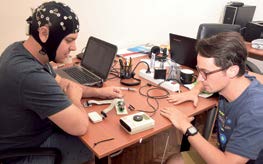 |
A new Belgrade-located startup company
“mBrainTrain” has developed the first
mobile EEG devices of premium quality the
usage of which is still to move forward the boundaries
of (neuro) science.
“Smarting” already has more than 50 prominent
users, top class research laboratories
in 15 most developed countries of the world,
and “Brawas” will be available to all of us –
for optimization of our mental and emotional
conditions, for cognitive anti-aging, for purposes
that we do not yet portend…
At the beginning of the last century, recording
of brain waves – electroencephalography (EEG) –
was one of those discoveries that
marked a milestone in the history
of medicine. Numerous
similar revolutionary medical
innovations had to wait till the
end of the 20th century and
the era of computer
technology
in order to
have their full
practical usage
feasible, or more
efficient.
|
MEDICINE
Lyme disease |
|
 |
Bacterial infection transmitted by infected
ticks can cause in a human being a serious
multisystem disease. However, if discovered at
an early stage, it can be completely cured with
antibiotics. We live in a geographic area where
with every stay outdoors we are exposed to the
risk of contact with these tiny parasites. Therefore,
we need to take this into consideration,
warns Boško Misita, pharmacist and medical
biochemist of Bel Medic, Belgrade.
Who would even think that we could be
exposed to some serious danger while walking
cozily in a city park or in a private garden?
Lyme diseases, for which there is no vaccine,
warnings about its transmitter, the tick, as the
most dangerous “beast” of the quiet forests,
parks and meadows, should not be taken as a
joke. This tiny, seemingly harmless ectoparasite,
of the class of Arachnida, is active from
late spring till early autumn, and in that period,
as a potential transmitter of the Lyme borreliosis,
can be dangerous for human health
|
MEDICINE
Ultrasound in urology |
|
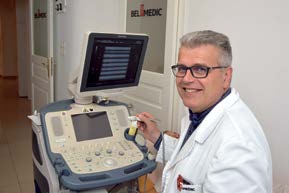 |
Ultrasound checkup is one of the initial health
checks in the diagnostic algorithms
because it is low cost, efficient and with no
exposure to ion rays. In some cases it is sufficient
for setting of an exact diagnose.
Ultrasound diagnostics, or ultrasonography,
has an important role in assessment of the urinary
tract. As in other areas of medicine, in urology,
which has relied on ultrasonography for
more than three decades, the ultrasound is one
of the initial radiological checkups, because of
its availability, lower cost and complete harmlessness
– there is no exposure to ion rays.
Apart from that, the checkup does not require
usage of contrast agents which can cause
allergic reactions with some persons, and no
particular preparation of the patient is needed.
Dr. Zoran Radosavljević, urology specialist
and ultrasound subspecialist in the Belgrade
located General hospital Bel Medic, adds that
urological ultrasonography is a very quick and
efficient method which in the shortest period
of time can provide data not only on the diagnostic
path that should potentially be taken as
the next step, but often also the data based on
which the final diagnosis can be made.
|
Kompletni tekstove sa slikama i prilozima potražite u magazinu
"PLANETA" - štampano izdanje ili u ON LINE prodaji Elektronskog izdanja
"Novinarnica"
|
|
|
» Prijatelji Planete |
| » UZ 100 BR. „PLANETE” |
|

|
| » 20 GODINA PLANETE |
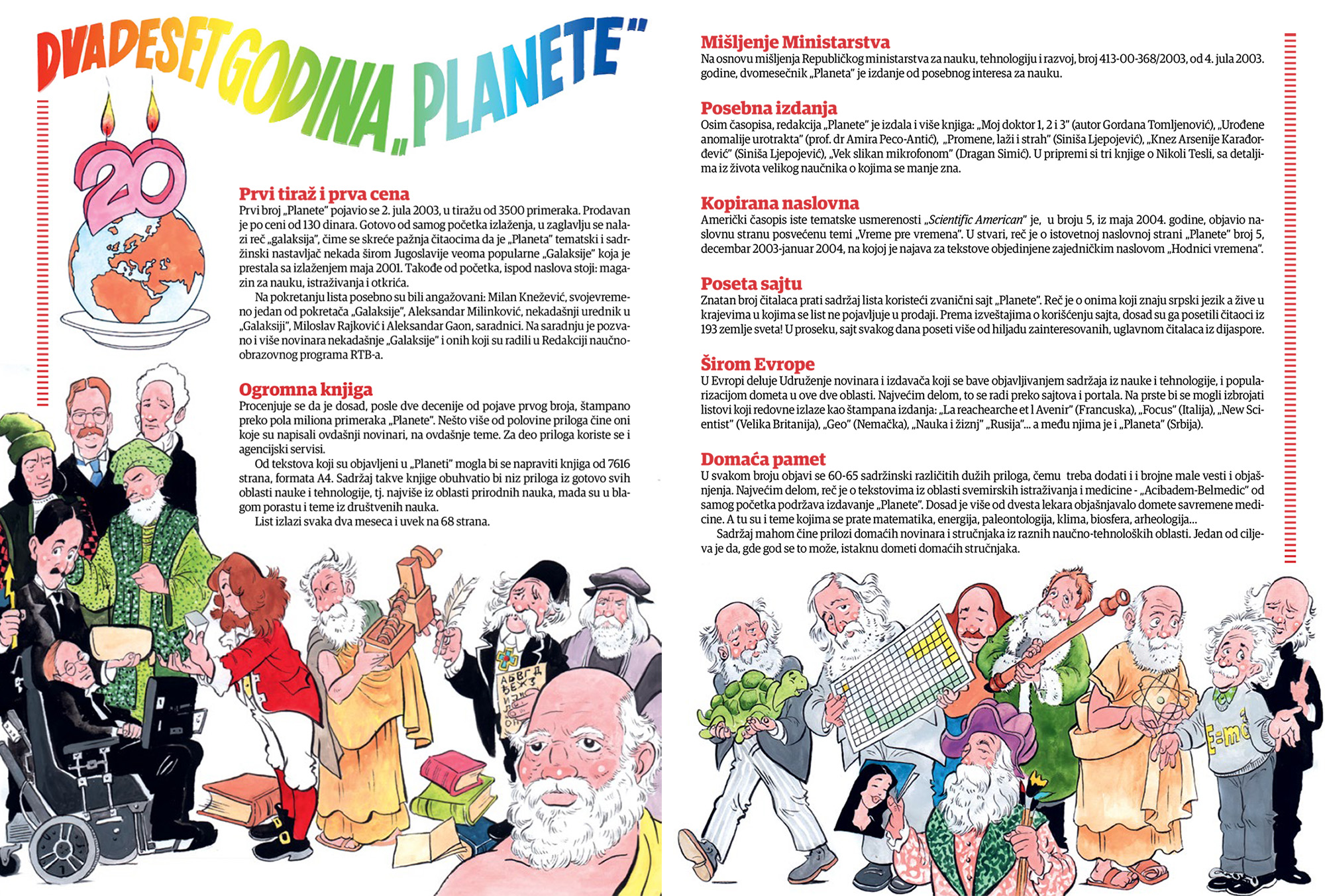



6 digitalnih izdanja:
4,58 EUR/540,00 RSD
Uštedite čitajući digitalna izdanja 50%
Samo ovo izdanje:
1,22 EUR/144,00 RSD
Uštedite čitajući digitalno izdanje 20%
www.novinarnica.net
Čitajte na kompjuteru, tabletu ili mobilnom telefonu

|
| » PRELISTAJTE |
NOVINARNICA predlaže
Prelistajte besplatno
primerke
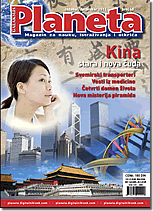
Planeta Br 48
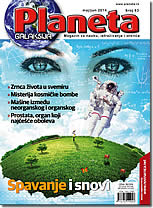
Planeta Br 63
|
| » BROJ 120 |
 |
Godina XXI
Novembar - Decembar 2024.
|
|
|

